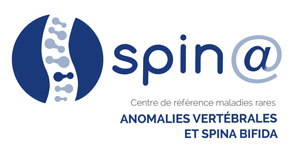Care and Management
In the adult PM&R service at the Rothschild Hospital, care is based on the impairments and disabilities presented by people with congenital spinal cord malformations: perineal disability (related to urinary, anorectal, genital and sexual problems), motor disability (related to motor impairment and orthopaedic disorders) and cognitive disability. The frequent complications associated with this pathology are also taken in consideration: skin lesions such as bedsores, overweight, etc. Particular attention is devoted to educational and professional integration, and support with administrative and medical procedures.
This complete care is possible via a multi-professional team including a dietician, occupational therapist (ergotherapist), nurses, physical therapist, PM&R physician, neuropsychologist, podiatrist or chiropodist and psychologist.
Various types of care pathways are available for assessment and/or rehabilitation: outpatient, consultation, day or full hospitalisation. Requests for consultation or assessment are received by the medical secretaries. Requests for hospitalisation for rehabilitation are received via the website: https://trajectoire.sante-ra.fr/Trajectoire/.
There are several care pathways on the Rothschild Hospital site:
- Perineal disability: consultation, education in self-catheterisation, transanal retrograde colic irrigation, urodynamic assessment, anorectal manometry, bladder kidney ultrasound, cystography
- Motor disability: consultation, walking laboratory assessment, chair clinic and positioning, foot care (podiatrist), lower-limb orthopaedic devices, outpatient or inpatient rehabilitation.
- Cognitive disability: neuropsychological assessment, psychological evaluation and guidance.
- Skin complications: joint assessment with the wound and healing service, review of bed or chair positioning.
- Overweight and obesity: assessment by a dietician and orientation.
For each of these pathways, patients benefit from partnership between physicians from different disciplines: urologist, orthopaedist, neurosurgeon, etc. These partnerships take place through multi-professional consultation meetings, which take place at the Pitié Salpêtrière site (with the urologists) and at the Rothschild site (with the neurosurgeons).
Finally, we are particularly interested in the ageing of people with congenital spinal cord defects, which is not yet well known, and we have developed a specific pathway to assess it.
Therapeutic patient education (TPE)
The adult PM&R service at the Rothschild Hospital has developed a standardised therapeutic education protocol for self-catheterisation “ASTUCE” (AutoSondage Therapeutique Utile pour des Compétences Educatives). It is designed for people referred to learn how to perform urinary self-catheterisation, whatever their pathology, age or sex. This protocol is deployed on a day hospitalisation unit, and takes place over 4 sessions. During the first session, an educational assessment is carried out with the nurse: the patient is invited to talk about his malformation, his experiences, what he knows about its consequences and his treatments. Common objectives are defined. The education to the technical gesture is then carried out. At the end of this first session, the patient receive a prescription for urinary catheters or with an appointment for another session if the procedure was difficult to achieve. A teleconsultation is carried out approximately 1 week later to ensure that all is going well and to enquire about any difficulties that may have arisen. The 3 other sessions, at 1, 3 and 6 months, are scheduled to review the technique and deal with any difficulties that may have arisen. Follow-up is then carried out by the doctor responsible for monitoring perineal disability.
